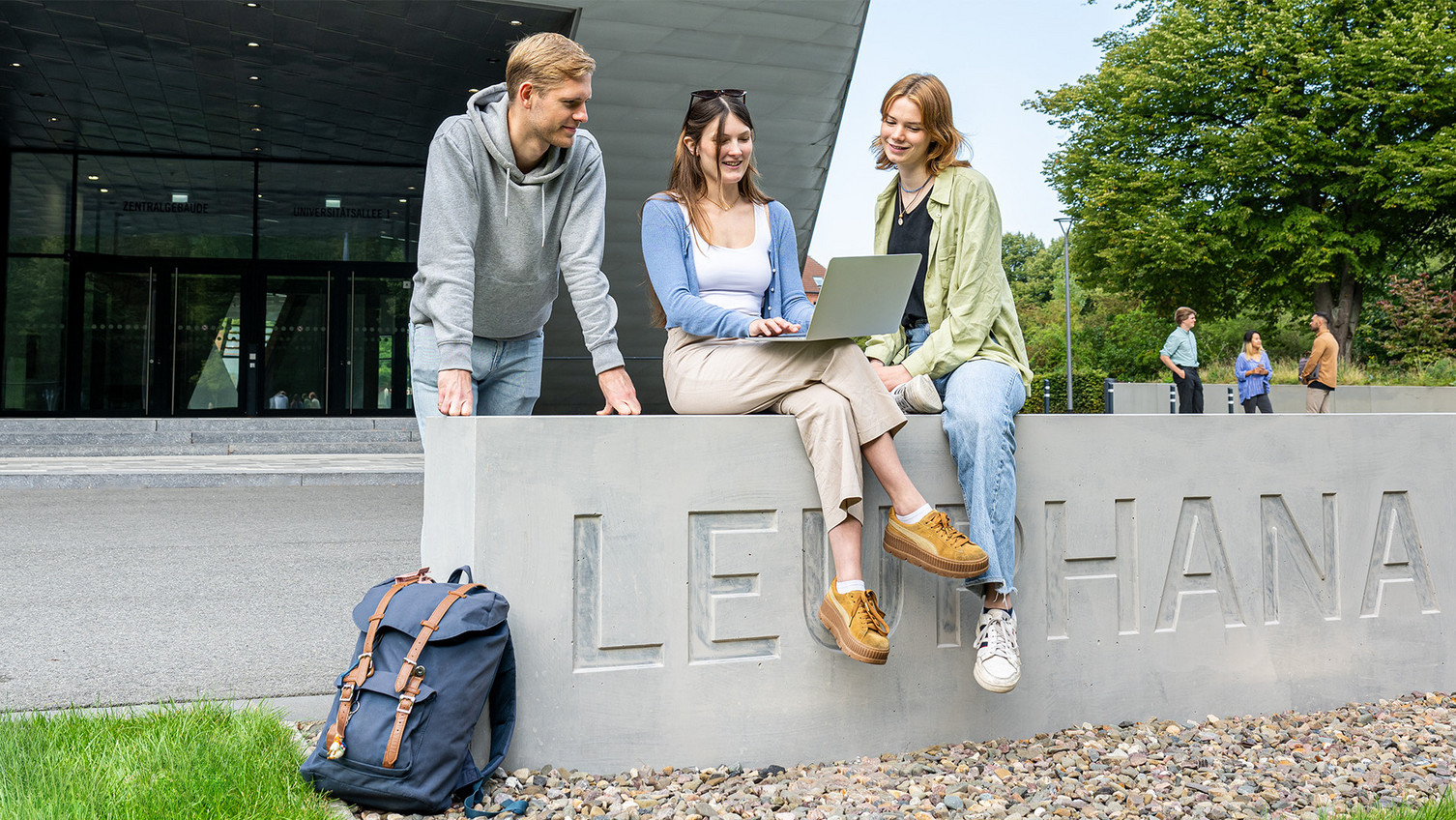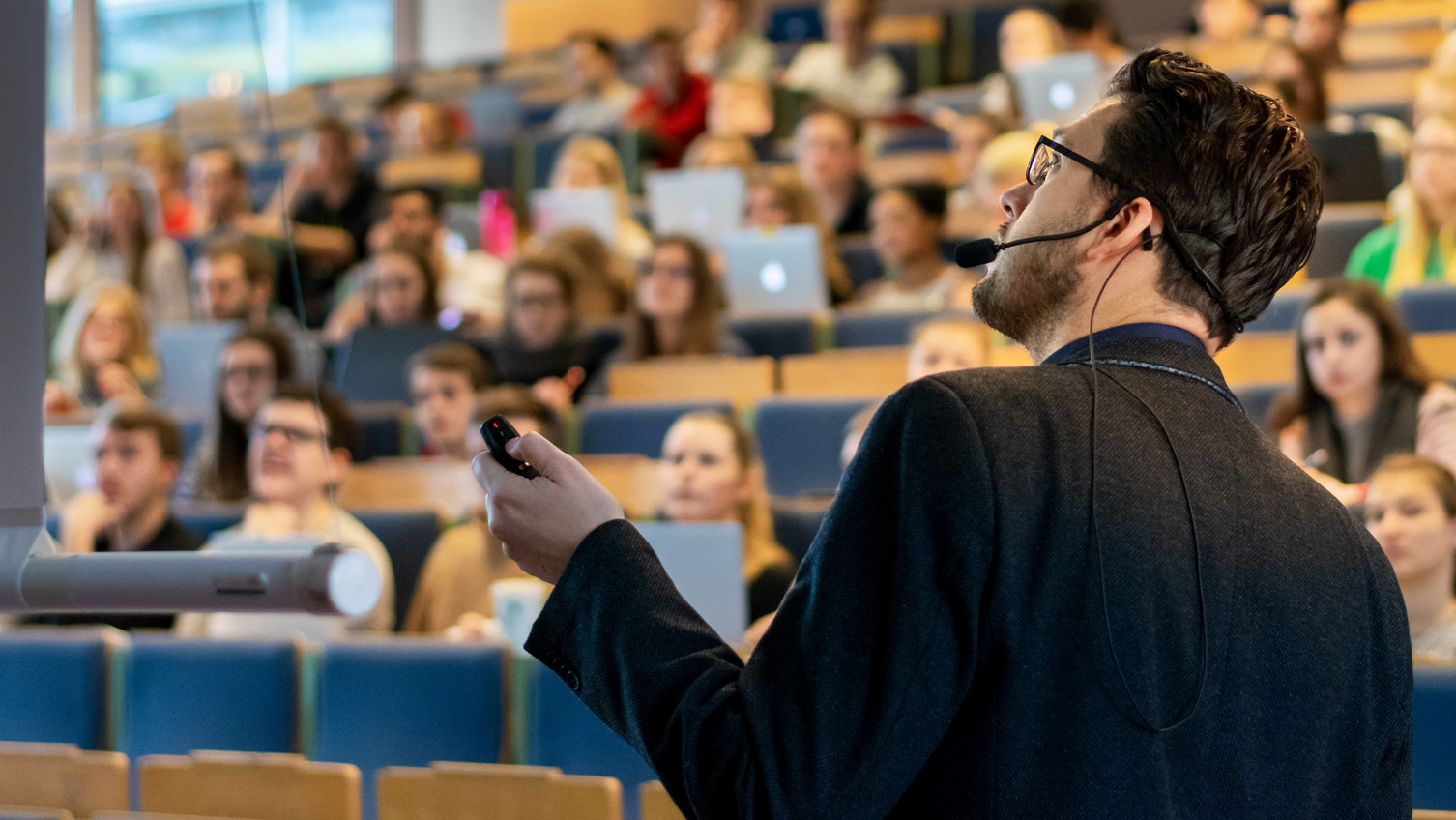AoL (Assurance of Learning)
Assurance of Learning (AoL) is a quality management tool which evaluates study programs as a whole. It allows to monitor whether students acquire those competencies and skills which the program is designed to offer. It doesn’t evaluate individual students or teachers, but it improves the program based on what and how all students are learning.
The following sections offer more insights for students and faculty members.
Student Perspective
Student Information & Involvement
 ©Leuphana/Markus Tiemann
©Leuphana/Markus Tiemann
What does AOL mean for you and why does it matter?
The AoL process helps us to adapt courses, improve content and ensure that your degree stays relevant in this transforming world. AoL builds on information we gather in the programs. From time to time, part of your coursework like thesis or project might be used anonymously to assess if students are meeting key learning goals. You don’t need to do anything extra, but your work helps us make your program even better.
What does AOL measure?
Assurance of Learning (AoL) measures whether students achieve the program competency goals of their academic program. While the program competency goals vary by program, they are all grounded in four overarching dimensions:
Disciplinary knowledge: Understanding and applying core concepts of your field.
Academic & research skills: Engaging in scientific reasoning, critical thinking and thorough research.
Entrepreneurial and solution-oriented mindset: Developing innovative and practical approaches to challenges.
Responsible management: Understanding and applying ethical principles and sustainability values in business decision-making, while navigating complex societal and organizational challenges.
If you’d like to explore the specific goals for your program, you can find them below in the expandable sections.
How can you get involved?
The best place to express your needs, wishes, and concerns about your studies is the quality circle for your degree program. This takes place once a year when you and all other students in your bachelor's or master's program are invited via mystudy. At this meeting with professors and coordinators, you can provide feedback, exchange ideas, and improve the study environment. You don't need to be an expert, just bring the perspective of your year group. AoL helps to make programs better, fairer, and more relevant. Join us to shape the future of your studies and make your voice heard!
If you are unable to attend the quality circle or have an urgent concern about the quality of your program, please send us an email at aol@leuphana.de.
Here are the competency goals for your study program:
Knowledge and understanding: Students demonstrate integrated academic knowledge and understanding of business information systems.
The student has solid knowledge on core theories, concepts, and models in (business) information systems.
The student reflects on the limits of theories, concepts, and models.
The student applies academic concepts and theories to practical and/or theoretical problems in (business) information systems.
Academic skills: Students master basic scientific working techniques and justify their own decisions and steps of action.
The student poses relevant research questions.
The student develops appropriate research and/or development design.
The student applies research and/or development methods to draw theoretical and/or practical conclusions.
Solutions for complex problems: Students develop and evaluate solution-oriented propositions.
The student outlined the relevance of the problem statement or research question for its context.
The student appropriately developed specific concepts or artifacts (e.g. an algorithm, a model, a program) for implementation.
The student discussed how the solution contributed to research and advanced the knowledge in the respective field.
Knowledge and expertise: Students critically reflect and apply academic knowledge in the field of management and entrepreneurship.
The student has profound knowledge on core theories, concepts, and models of the field of management and entrepreneurship.
The student applied scientifically based theories, concepts, models, and methods, to practical and/or theoretical problems.
The student recognizes and understands how systems are embedded within different domains and different scales, analyses complex systems, and deals with uncertainty.
Academic skills: Students work independently in an academic context and justify and reflect on their own actions.
The student knows and understands relevant data and its availability.
The student chose and applied a sophisticated and/or specialized research design.
The student critically reflects on applied theories and methods as well as their own conclusions.
Entrepreneurial thinking: Students develop and evaluate solution-oriented propositions.
The student outlined the relevance of the problem statement or research question from a theoretical and practical perspective.
The student discussed the implications of the topic and/or the findings for theory and practice.
The students developed (and implemented) innovative solution options that further innovative activities.
The student developed convincing propositions for solving the project tasks.
Responsible management: Students act responsibly in their decision-making.
The student critically reflects on the relations between business and society: The student has profound knowledge of responsible management and identifies important aspects concerning responsible management in a given situation.
The student considered principles and/or practices of responsible management: The student negotiates (sustainability) values, principles, goals, and targets, in a context of conflicts of interests and trade-offs, uncertain knowledge and/or contradictions.
Knowledge and expertise: Students critically reflect and apply academic knowledge in the field of sustainable accounting and finance.
The student has profound knowledge on core theories, concepts, and models of the field of sustainable accounting and finance.
The student applied scientifically based theories, concepts, models, and methods, to practical and/or theoretical problems.
The student recognizes and understands how systems are embedded within different domains and different scales, analyses complex systems, and deals with uncertainty.
Academic skills: Students work independently in an academic context and justify and reflect on their own actions.
The student knows and understands relevant data and its availability.
The student chose and applied a sophisticated and/or specialized research design.
The student critically reflected on applied theories and methods as well as their own conclusions.
Entrepreneurial thinking: Students develop and evaluate solution-oriented propositions.
The student outlined the relevance of the problem statement or research question from a theoretical and practical perspective.
The student discussed the implications of the topic and/or the findings for theory and practice.
The students developed (and implemented) innovative solution options that further innovative activities.
The student developed convincing propositions for solving the project tasks.
Responsible management: Students act responsibly in their decision-making.
The student critically reflects on the relations between business and society: The student has profound knowledge of responsible management and identifies important aspects concerning responsible management in a given situation.
The student considered principles and/or practices of responsible management: The student negotiates (sustainability) values, principles, goals, and targets, in a context of conflicts of interests and trade-offs, uncertain knowledge and/or contradictions.
Scientific research competences: Contributions to complex theory.
The student devised an appropriate formalization of the problem.
The technical contribution is innovative and conceptually novel.
The technical contribution or theses contributes to a complex theory.
The mathematical derivation of the technical contribution is correct.
The empirical evaluation supports the claims of the thesis.
Skills for analyzing problems and developing solutions: Students develop solutions based on a thorough analysis which considers contextual specifics.
The student puts the thesis adequately in context with related scientific work.
The student puts the thesis adequately in context with related practical work.
The student developed convincing propositions for solving the project tasks.
Disciplinary expertise: Students apply theoretical knowledge on questions/challenges in the field of modern production systems and production technology (industry 4.0).
The student is able to define and interpret terminologies, specific topics, limitations, and common discourses of modern production systems and production technology.
The student is able to think and act logically in their field.
The student is able to apply scientifically based concepts, theories, models and methods to practical and theoretical as well as past, present and future problems.
Scientific competences: Students demonstrate high standards of applying appropriate methods for research and development.
The student knows with which method they obtain relevant data.
The student applied sophisticated and/or specialized methodologies or approaches.
The student performed rigorous data analysis.
Solutions for complex problems: Students develop and evaluate solution-oriented propositions.
The student develops solutions for complex interdisciplinary challenges in the context of global transformations and specifically digitalization.
The student discussed how the solution contributed to research and advanced the knowledge in the respective field.
The student developed convincing propositions for solving the project tasks.
Faculty Perspective
Faculty Guidance & Support
 ©Leuphana/Kersten Benecke
©Leuphana/Kersten Benecke
What is your role in AoL?
As a faculty member and lecturer, your role in Assurance of Learning is to evaluate the extent to which students are achieving the program competency goals.
All bachelor’s and master’s theses you supervise need to be evaluated against the program competency goals. For this, you will automatically receive an email inviting you to a evaluate the specific thesis in a survey. If a course you are teaching is selected for AoL evaluation, you will be asked to assess your students using a separate AoL evaluation survey. The AoL evaluation is independent of the regular grading and is used exclusively for quality assurance at the program level.
Dr. Lotte Lutz of the team of the Dean’s office supports you throughout this process and is available for any questions via aol@leuphana.de.
What does the AoL cycle look like?
The AoL cycle follows a structured feedback loop. First, measurable learning objectives are defined for each program competency goal. Student performance is then assessed against these criteria using selected modules and all final theses. The collected data is analyzed to identify areas for improvement. These insights are integrated into the ongoing quality management and development of the curriculum. The Quality Circles of each program are one central place for developing improvements. The outcomes and effects of the improvements are monitored through repeated measurements in future loops.
What kind of data is collected and how?
There are a couple of main sources for data collection:
Evaluations of final theses (bachelor’s, master’s, PhD) are one main data source; here, supervisors assess the learning outcomes against the competency goals. In selected modules, faculty members and lecturers evaluate student performance based on specific learning competencies. Discussion formats such as Quality Circles add contextual information.
What happens after the data is collected?
After data is collected, it is analyzed and discussed with program managers and faculty. It enriches the discussion in the Quality Circle. The findings are used to improve the quality of study programs through changes to curriculum design, evaluation processes or teaching coordination. This ensures that programs remain aligned with their intended competency goals and continue to evolve based on student learning outcomes.
Curriculum Mapping at the School of Management and Technology
Curriculum Mapping is a tool used to visualize and understand how courses contribute to the overall competency goals within a degree program. It helps identify which competencies are addressed, where overlaps occur and where gaps might exist. At the School of Management and Technology, Curriculum Mapping supports both quality assurance and program development by making the structure of teaching and learning more transparent. It complements the Assurance of Learning (AoL) system and serves as a foundation for informed decisions about curriculum design and improvement.
Downloads
Interested in learning more about AoL? Then you've come to the right place!
Contact & Feedback
We welcome your thoughts.
For questions or suggestions related to program quality, please reach out to the responsible contact person:
AOL Process:
- Dr. Lotte Lutz
Bachelor Programs Business Administration:
- Anja Roß
Bachelor Programs Engineering and Information Systems:
- Hanka Majewski
Master Programs Management:
- Julia Oehmichen
